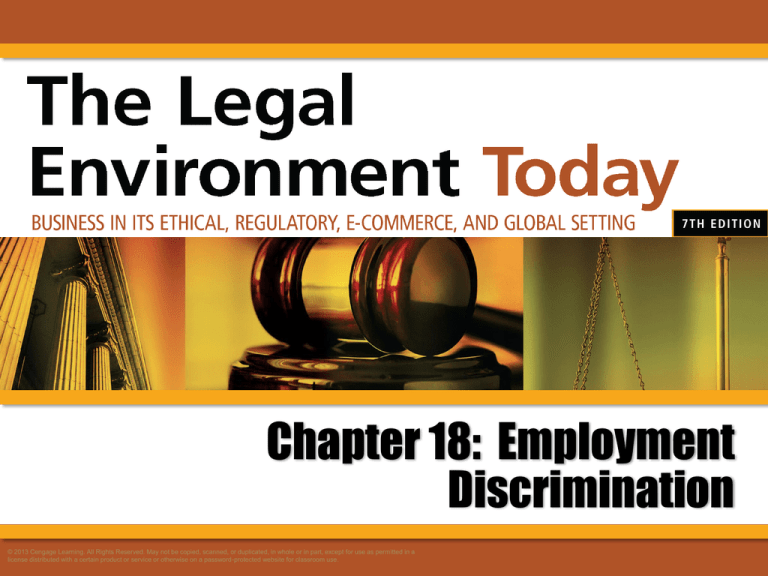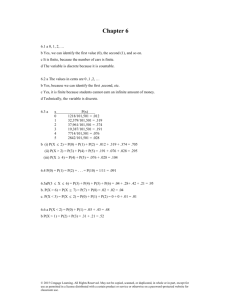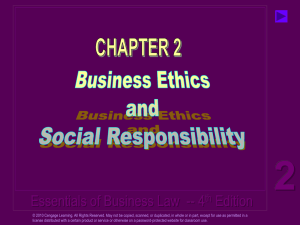
Chapter 18: Employment
Discrimination
© 2013 Cengage Learning. All Rights Reserved. May not be copied, scanned, or duplicated, in whole or in part, except for use as permitted in a
© 2013 distributed
Cengage Learning.
All Rights
Reserved.
May
be copied,
or duplicated,
in whole
or in part, except
license
with a certain
product
or service
or not
otherwise
on a scanned,
password-protected
website
for classroom
use. for use as permitted in a
license distributed with a certain product or service or otherwise on a password-protected website for classroom use.
Introduction
The most important federal antidiscrimination laws are:
• Title VII of the Civil Rights Act of 1964.
• The Age Discrimination in Employment
Act.
• The Equal Pay Act.
• The Americans with Disabilities Act.
© 2013 Cengage Learning. All Rights Reserved. May not be copied, scanned, or duplicated, in whole or in part, except for use as permitted in a
license distributed with a certain product or service or otherwise on a password-protected website for classroom use.
2
Title VII of the
Civil Rights Act of 1964
Title VII prohibits discrimination in
employment on the basis of race, sex,
color, religion, and national origin.
“Sex” now includes pregnancy.
• Applies to employers involved with
interstate commerce with 15 or more
employees.
© 2013 Cengage Learning. All Rights Reserved. May not be copied, scanned, or duplicated, in whole or in part, except for use as permitted in a
license distributed with a certain product or service or otherwise on a password-protected website for classroom use.
3
Title VII of the
Civil Rights Act of 1964
In addition to prohibiting religious
discrimination, employers must
reasonably accommodate an
employee’s religious practices.
EEOC: monitors compliance with Title
VII.
© 2013 Cengage Learning. All Rights Reserved. May not be copied, scanned, or duplicated, in whole or in part, except for use as permitted in a
license distributed with a certain product or service or otherwise on a password-protected website for classroom use.
4
Title VII of the
Civil Rights Act of 1964
Intentional Discrimination.
• “Disparate-Treatment” Discrimination.
Applicant must prove:
• Is a member of a protected class;
• Applied, qualified , rejected for job;
• Employer continued to seek applicants.
• Burden then shifts to employer who must
articulate a legal reason for not hiring.
© 2013 Cengage Learning. All Rights Reserved. May not be copied, scanned, or duplicated, in whole or in part, except for use as permitted in a
license distributed with a certain product or service or otherwise on a password-protected website for classroom use.
5
Title VII of the
Civil Rights Act of 1964
Unintentional Discrimination.
• “Disparate Impact” Discrimination:
• Occurs when a protected group of people
is adversely affected by an employer’s
practices, procedures, or tests, even
though they do not appear to be
discriminatory.
© 2013 Cengage Learning. All Rights Reserved. May not be copied, scanned, or duplicated, in whole or in part, except for use as permitted in a
license distributed with a certain product or service or otherwise on a password-protected website for classroom use.
6
Title VII of the
Civil Rights Act of 1964
Unintentional Discrimination.
• Pool of Applicants Test: plaintiff shows
percentage of the protected class in
employer’s workforce does not reflect
percentage in local labor market.
© 2013 Cengage Learning. All Rights Reserved. May not be copied, scanned, or duplicated, in whole or in part, except for use as permitted in a
license distributed with a certain product or service or otherwise on a password-protected website for classroom use.
7
Title VII of the
Civil Rights Act of 1964
Unintentional Discrimination.
• Rate of Hiring: plaintiff compares
selection rates of members of
protected class with nonmembers in
employer’s workforce. According to
EEOC, less than 80% may show
disparate impact.
© 2013 Cengage Learning. All Rights Reserved. May not be copied, scanned, or duplicated, in whole or in part, except for use as permitted in a
license distributed with a certain product or service or otherwise on a password-protected website for classroom use.
8
Title VII of the
Civil Rights Act of 1964
Discrimination Based on Race, Color,
and National Origin.
• Title VII prohibits employment policies
or intentional/ negligent discrimination
on basis of race, color or national
origin.
© 2013 Cengage Learning. All Rights Reserved. May not be copied, scanned, or duplicated, in whole or in part, except for use as permitted in a
license distributed with a certain product or service or otherwise on a password-protected website for classroom use.
9
Title VII of the
Civil Rights Act of 1964
Discrimination Based on Race, Color,
and National Origin.
• Reverse” Discrimination: Title VII also
protects against discrimination against
majority group individuals, such as
white males. Ricci v. DeStefano (2009).
• Potential “Section 1981” Claims.
© 2013 Cengage Learning. All Rights Reserved. May not be copied, scanned, or duplicated, in whole or in part, except for use as permitted in a
license distributed with a certain product or service or otherwise on a password-protected website for classroom use.
10
Title VII of the
Civil Rights Act of 1964
Discrimination Based on Religion.
• Employers must “reasonably
accommodate” the “sincerely held”
religious practices of its employees,
unless to do so would cause undue
hardship to employer’s business.
© 2013 Cengage Learning. All Rights Reserved. May not be copied, scanned, or duplicated, in whole or in part, except for use as permitted in a
license distributed with a certain product or service or otherwise on a password-protected website for classroom use.
11
Title VII of the
Civil Rights Act of 1964
Discrimination Based on Gender.
• Employers are prohibited from
classifying jobs based on gender, unless
employer can prove gender is essential
to the job.
• Pregnancy Discrimination Act.
• Equal Pay Act (1963).
• Lilly Ledbetter Fair Pay Act (2009).
© 2013 Cengage Learning. All Rights Reserved. May not be copied, scanned, or duplicated, in whole or in part, except for use as permitted in a
license distributed with a certain product or service or otherwise on a password-protected website for classroom use.
12
Title VII of the
Civil Rights Act of 1964
Constructive Discharge.
• Occurs when an employer causes
working conditions to be so intolerable
that a reasonable person would feel
compelled to quit.
• An employee can be “constructively
discharged” but still leave voluntarily.
© 2013 Cengage Learning. All Rights Reserved. May not be copied, scanned, or duplicated, in whole or in part, except for use as permitted in a
license distributed with a certain product or service or otherwise on a password-protected website for classroom use.
13
Title VII of the
Civil Rights Act of 1964
Constructive Discharge.
• Proving Constructive Discharge.
• Plaintiff must present objective proof of
intolerable working conditions, which
employer knew about and failed to correct.
• Employee’s resignation must be a
foreseeable result of working conditions.
© 2013 Cengage Learning. All Rights Reserved. May not be copied, scanned, or duplicated, in whole or in part, except for use as permitted in a
license distributed with a certain product or service or otherwise on a password-protected website for classroom use.
14
Title VII of the
Civil Rights Act of 1964
Sexual Harassment: Title VII protects
employees against sexual
harassment in the workplace.
• Two forms of sexual harassment:
• Quid Pro Quo.
• Hostile Work Environment.
© 2013 Cengage Learning. All Rights Reserved. May not be copied, scanned, or duplicated, in whole or in part, except for use as permitted in a
license distributed with a certain product or service or otherwise on a password-protected website for classroom use.
15
Title VII of the
Civil Rights Act of 1964
Sexual Harassment.
• Quid Pro Quo sexual harassment
involves demands for sexual favors are
demanded in return for job
opportunities, promotions, salary,
increases or other tangible benefits.
© 2013 Cengage Learning. All Rights Reserved. May not be copied, scanned, or duplicated, in whole or in part, except for use as permitted in a
license distributed with a certain product or service or otherwise on a password-protected website for classroom use.
16
Title VII of the
Civil Rights Act of 1964
Sexual Harassment.
• Hostile Work Environment. Occurs
when workplace is permeated with
discriminatory intimidation, ridicule,
insult so severe to alter the conditions
of the victim’s employment and create
an abusive working environment.
© 2013 Cengage Learning. All Rights Reserved. May not be copied, scanned, or duplicated, in whole or in part, except for use as permitted in a
license distributed with a certain product or service or otherwise on a password-protected website for classroom use.
17
Title VII of the
Civil Rights Act of 1964
Sexual Harassment.
• Harassment by Supervisors.
• Usually involves a quid pro quo.
• For employer to be liable for a supervisor’s
sexual harassment, a supervisor must have
taken a tangible employment action
against the employee.
© 2013 Cengage Learning. All Rights Reserved. May not be copied, scanned, or duplicated, in whole or in part, except for use as permitted in a
license distributed with a certain product or service or otherwise on a password-protected website for classroom use.
18
Title VII of the
Civil Rights Act of 1964
Sexual Harassment.
• Harassment by Supervisors.
• The Ellerth / Faragher Affirmative Defense
is based on two 1998 Supreme Court
decisions. Defense has two elements:
–(1) Employer must have taken
reasonable care to prevent and
promptly correct any sexually harassing
behavior, and
© 2013 Cengage Learning. All Rights Reserved. May not be copied, scanned, or duplicated, in whole or in part, except for use as permitted in a
license distributed with a certain product or service or otherwise on a password-protected website for classroom use.
19
Title VII of the
Civil Rights Act of 1964
Sexual Harassment.
• Harassment by Supervisors.
• The Ellerth / Faragher Affirmative Defense.
–(2) Plaintiff-employee must have
unreasonable failed to take advantage of
preventative or corrective opportunities
to avoid harm.
• If an employer can prove both elements, he
will not be liable for supervisor’s harassment.
© 2013 Cengage Learning. All Rights Reserved. May not be copied, scanned, or duplicated, in whole or in part, except for use as permitted in a
license distributed with a certain product or service or otherwise on a password-protected website for classroom use.
20
Title VII of the
Civil Rights Act of 1964
Sexual Harassment.
• Harassment by Supervisors.
• Retaliation by Employers: action would have
dissuaded a reasonable worker from making
or supporting a discrimination claim.
• CASE 18.1 THOMPSON V. NORTH AMERICAN
STAINLESS, LP (2011). How could NAS have
protected themselves from this claim?
© 2013 Cengage Learning. All Rights Reserved. May not be copied, scanned, or duplicated, in whole or in part, except for use as permitted in a
license distributed with a certain product or service or otherwise on a password-protected website for classroom use.
21
Title VII of the
Civil Rights Act of 1964
Sexual Harassment.
• Harassment by Co-Workers and Others.
Employer generally liable only if employer
knew or should have known and failed to
take action.
• Notice to supervisor is sufficient under
agency law. Employers may also be liable for
harassment by non-employees.
© 2013 Cengage Learning. All Rights Reserved. May not be copied, scanned, or duplicated, in whole or in part, except for use as permitted in a
license distributed with a certain product or service or otherwise on a password-protected website for classroom use.
22
Title VII of the
Civil Rights Act of 1964
Sexual Harassment.
• Same Gender Harassment.
• In 1998, Supreme Court held in Oncale v.
Sundowner Offshore Services that Title VII
prohibitions against sexual harassment
extended to same-sex harassment. Easier to
prove when harasser is homosexual.
© 2013 Cengage Learning. All Rights Reserved. May not be copied, scanned, or duplicated, in whole or in part, except for use as permitted in a
license distributed with a certain product or service or otherwise on a password-protected website for classroom use.
23
Title VII of the
Civil Rights Act of 1964
Online Harassment.
• Hostile work environment created using
company chat, blogs, email.
• Employers can avoid liability with
prompt remedial action.
• Employees may be discharged for using
company computers to distribute
offensive material to coworkers.
© 2013 Cengage Learning. All Rights Reserved. May not be copied, scanned, or duplicated, in whole or in part, except for use as permitted in a
license distributed with a certain product or service or otherwise on a password-protected website for classroom use.
24
Title VII of the
Civil Rights Act of 1964
Remedies under Title VII.
• Liability may be extensive. Plaintiff may
receive:
• Reinstatement.
• Back Pay.
• Retroactive Promotions; and
• Damages.
© 2013 Cengage Learning. All Rights Reserved. May not be copied, scanned, or duplicated, in whole or in part, except for use as permitted in a
license distributed with a certain product or service or otherwise on a password-protected website for classroom use.
25
Discrimination Based on Age
The Age Discrimination in
Employment Act (ADEA) protects
individuals over the age of 40 from
workplace discrimination that favors
younger workers.
© 2013 Cengage Learning. All Rights Reserved. May not be copied, scanned, or duplicated, in whole or in part, except for use as permitted in a
license distributed with a certain product or service or otherwise on a password-protected website for classroom use.
26
Discrimination Based on Age
Procedures under the ADEA.
• Plaintiff must show discrimination was
THE reason for adverse employment
action.
• CASE 18.2 MORA V. JOHNSON MEMORIAL
FOUNDATION, INC. (2010). What was the
‘disputed question of material fact’ the
court referred to?
© 2013 Cengage Learning. All Rights Reserved. May not be copied, scanned, or duplicated, in whole or in part, except for use as permitted in a
license distributed with a certain product or service or otherwise on a password-protected website for classroom use.
27
Discrimination Based on Age
• Replacing Older Workers with Younger
Workers. Employee must prove that
discrimination was based on age bias.
The bigger the age gap the more likely
the bias.
• State Employees Not Covered by the
ADEA.
© 2013 Cengage Learning. All Rights Reserved. May not be copied, scanned, or duplicated, in whole or in part, except for use as permitted in a
license distributed with a certain product or service or otherwise on a password-protected website for classroom use.
28
Discrimination based on Disability
The Americans with Disability Act
(ADA) requires employers to offer
“reasonable accommodation” to
employees or applicants with a
disability who are otherwise qualified
for the job they hold or seek.
© 2013 Cengage Learning. All Rights Reserved. May not be copied, scanned, or duplicated, in whole or in part, except for use as permitted in a
license distributed with a certain product or service or otherwise on a password-protected website for classroom use.
29
Discrimination based on Disability
Procedures Under the ADA.
• To prevail, plaintiff must show:
• She has a “disability.”
• She is otherwise qualified for the
employment in question; and
• She was excluded from employment solely
because of the disability.
• Plaintiff must first exhaust her claim
through the EEOC process.
© 2013 Cengage Learning. All Rights Reserved. May not be copied, scanned, or duplicated, in whole or in part, except for use as permitted in a
license distributed with a certain product or service or otherwise on a password-protected website for classroom use.
30
Discrimination based on Disability
What Is A “Disability”?
• ADA defines disability as:
• Physical or mental impairment that
“substantially limits one or more of major
life activities; or
• A record of such impairment; or
• Being regarded as having such an
impairment.
© 2013 Cengage Learning. All Rights Reserved. May not be copied, scanned, or duplicated, in whole or in part, except for use as permitted in a
license distributed with a certain product or service or otherwise on a password-protected website for classroom use.
31
Discrimination based on Disability
What Is A “Disability”?
• 2008 Amendments reverse Supreme
Court’s narrow definition of disability.
• CASE 18.3 ROHR V. SALT RIVER PROJECT
AGRICULTURAL IMPROVEMENT AND POWER
DISTRICT (2009). Diabetes is a disability if it
significantly restricts eating.
© 2013 Cengage Learning. All Rights Reserved. May not be copied, scanned, or duplicated, in whole or in part, except for use as permitted in a
license distributed with a certain product or service or otherwise on a password-protected website for classroom use.
32
Discrimination based on Disability
Reasonable Accommodation.
• Undue Hardship:
• If an employee can perform the job with
reasonable accommodation, without undue
hardship on the employer, the
accommodation must be made.
• Examples: wheelchair ramps.
© 2013 Cengage Learning. All Rights Reserved. May not be copied, scanned, or duplicated, in whole or in part, except for use as permitted in a
license distributed with a certain product or service or otherwise on a password-protected website for classroom use.
33
Discrimination based on Disability
Reasonable Accommodation.
• Job Applications and Physical Exams.
• Modifications to applications and selection
process so those with disabilities can
compete.
• Employers are restricted on pre-hiring
questions and physical exams.
© 2013 Cengage Learning. All Rights Reserved. May not be copied, scanned, or duplicated, in whole or in part, except for use as permitted in a
license distributed with a certain product or service or otherwise on a password-protected website for classroom use.
34
Discrimination based on Disability
Reasonable Accommodation.
• Substance Abusers: only FORMER drug
users completed or going through supervised
drug rehabilitation programs qualify as
“disabled.”
• Health Insurance Plans: equal access to
health care.
© 2013 Cengage Learning. All Rights Reserved. May not be copied, scanned, or duplicated, in whole or in part, except for use as permitted in a
license distributed with a certain product or service or otherwise on a password-protected website for classroom use.
35
Discrimination based on Disability
Association Discrimination.
• Protects individuals based on
associations with other disabled
persons. To prevail, plaintiff must show
she was:
• (1) qualified for the job, (2) subjected to an
adverse employment action, and (3) known by
her employer to have a relative or an associate
with a disability.
© 2013 Cengage Learning. All Rights Reserved. May not be copied, scanned, or duplicated, in whole or in part, except for use as permitted in a
license distributed with a certain product or service or otherwise on a password-protected website for classroom use.
36
Defenses to Employment
Discrimination
There are four basic types of
defenses to employment
discrimination claims.
• Business Necessity.
• Bona Fide Occupational Qualification.
• Seniority Systems.
• After-Acquired Evidence.
© 2013 Cengage Learning. All Rights Reserved. May not be copied, scanned, or duplicated, in whole or in part, except for use as permitted in a
license distributed with a certain product or service or otherwise on a password-protected website for classroom use.
37
Defenses to Employment
Discrimination
Business Necessity.
• Requires employer to demonstrate a
job qualification is reasonably
necessary to the legitimate conduct of
the employer’s business.
• Business necessity is a defense to disparate
impact discrimination.
© 2013 Cengage Learning. All Rights Reserved. May not be copied, scanned, or duplicated, in whole or in part, except for use as permitted in a
license distributed with a certain product or service or otherwise on a password-protected website for classroom use.
38
Defenses to Employment
Discrimination
Bona Fide Occupational
Qualification.
• BFOQ defense requires an employer to
show a particular skill is necessary for
the performance of a particular job.
• The BFOQ defense is used in cases of
disparate treatment discrimination.
© 2013 Cengage Learning. All Rights Reserved. May not be copied, scanned, or duplicated, in whole or in part, except for use as permitted in a
license distributed with a certain product or service or otherwise on a password-protected website for classroom use.
39
Defenses to Employment
Discrimination
Seniority Systems.
• Conditions the distribution of job
benefits on the length of time one has
worked for an employer.
• Can be a defense only if it is a bona fide
system, not designed to evade the effects
of the anti-discrimination laws.
© 2013 Cengage Learning. All Rights Reserved. May not be copied, scanned, or duplicated, in whole or in part, except for use as permitted in a
license distributed with a certain product or service or otherwise on a password-protected website for classroom use.
40
Defenses to Employment
Discrimination
After-Acquired Evidence.
• Evidence of misconduct, committed by an
employee who is suing an employer for
employment discrimination.
• Uncovered during the process of discovery
conducted in preparation for a defense against
the suit.
• Not an absolute defense for employer.
© 2013 Cengage Learning. All Rights Reserved. May not be copied, scanned, or duplicated, in whole or in part, except for use as permitted in a
license distributed with a certain product or service or otherwise on a password-protected website for classroom use.
41
Affirmative Action
Designed to “make up” for past
patterns of discrimination by giving
preferential treatment to protected
classes.
Constitutionality of Affirmative Action
Programs.
• May violate Fourteenth Amendment’s equal
protection.
© 2013 Cengage Learning. All Rights Reserved. May not be copied, scanned, or duplicated, in whole or in part, except for use as permitted in a
license distributed with a certain product or service or otherwise on a password-protected website for classroom use.
42
Affirmative Action
Constitutionality (cont’d).
• Affirmative action program is
constitutional only if it attempts to
remedy past discrimination and does
not make use of quotas or preferences.
© 2013 Cengage Learning. All Rights Reserved. May not be copied, scanned, or duplicated, in whole or in part, except for use as permitted in a
license distributed with a certain product or service or otherwise on a password-protected website for classroom use.
43
Affirmative Action
Affirmative Action in Schools.
• Generally, program that automatically
awards minority students specified
number of points is unconstitutional.
© 2013 Cengage Learning. All Rights Reserved. May not be copied, scanned, or duplicated, in whole or in part, except for use as permitted in a
license distributed with a certain product or service or otherwise on a password-protected website for classroom use.
44






